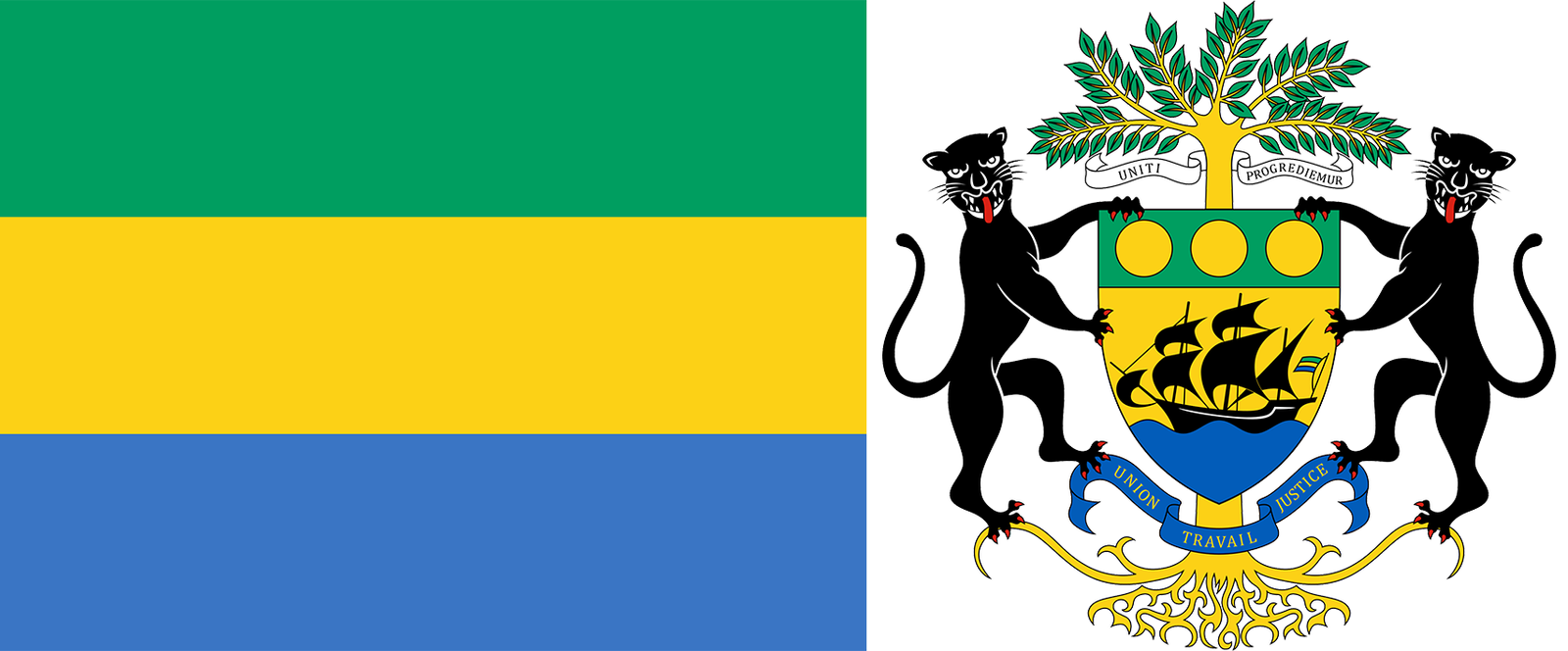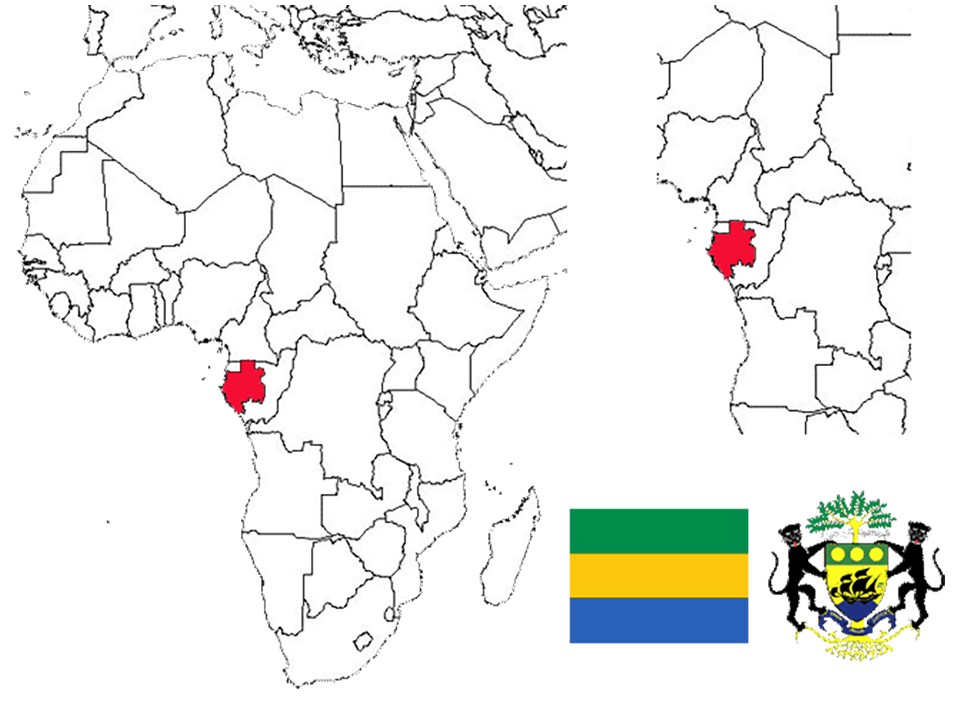FabulousFusionFood's Gabonaise Recipes Home Page
 The flag of Gabon (left) and the coat of arms
The flag of Gabon (left) and the coat of armsof Gabon (right).
Welcome to the summary page for FabulousFusionFood's Gabonaise recipes, part of Central Africa. This page provides links to all the Gabonaise recipes presented on this site, with 21 recipes in total.
The Gabon, officially: République Gabonaise; Gabonese Republic is one of the most prosperous countries of both Central and West Africa due to a small population, abundant natural resources, and foreign private investment. The capital and largest city is Libreville and the Gabon gained independence from France on August 17th 1960. Almost all Gabonese are of Bantu origin. Gabon has at least forty ethnic groups with separate languages and cultures. The Fang are generally thought to be the largest, although recent census data seem to favour the Bandjabi (or Nzebi). Others include the Myene, Bakota, Eshira, Bapounou, and Okande. Most inhabitants are Christians (with estimates of the Christian population ranging from 55 to 77 %), mostly members of the Roman Catholic Church. Other religious groups include animists, Muslims, and practitioners of indigenous African religions. French is the official language and it could be argued that this has provided an unifying force in the country.
Gabon sits at the crossroads between the north, south and west of the continent. This, along with the country's long history of French colonizaton makes it's cuisine one of the most varied in Africa. The most common dishes are pulped cucumbers with fouille de manioc, peanuts, and fish stews. Fish is the most common protein source though bush meat such as giant crocodile are also consumed. Most Gabonese dishes are based on the local 'berbere' or powdered hot chilli pepper and spiced clarified butter.
These recipes, for the major part, originate in Gabon. Otherwise they are fusion recipes with major Gabonaise influences.
Gabon officially the Gabonese Republic (French: République gabonaise), is a country on the Atlantic coast of Central Africa, on the equator, bordered by Equatorial Guinea to the northwest, Cameroon to the north, the Republic of the Congo to the east and south, and the Gulf of Guinea to the west. It has an area of 270,000 square kilometres (100,000 sq mi) and a population of 2.3 million people. There are coastal plains, mountains (the Cristal Mountains and the Chaillu Massif in the centre), and a savanna in the east. Libreville is the country's capital and largest city.
 The image above shows a view of Gabon (in red)
The image above shows a view of Gabon (in red)
in relation to Central Africa.Gabon's original inhabitants were the pygmy peoples. Beginning in the 14th century, Bantu migrants began settling in the area as well. The Kingdom of Orungu was established around 1700. The region was colonised by France in the late 19th century. Since its independence from France in 1960, Gabon has had three presidents. In the 1990s, it introduced a multi-party system and a democratic constitution that aimed for a more transparent electoral process and reformed some governmental institutions. Despite this, the Gabonese Democratic Party (PDG) remained the dominant party until its removal from power during the 2023 Gabonese coup d'état.
The official language of Gabon is French, and Bantu ethnic groups constitute around 95% of the country's population. Christianity is the nation's predominant religion, practised by about 80% of the population.
Equatorial Guinea obtained independence from Spain in 1968, under the bloody dictatorship of President Francisco Macías Nguema. He declared himself president for life in 1972, but was overthrown in a coup in 1979 by his nephew, Teodoro Obiang Nguema Mbasogo, who has served as the country's president since. Obiang's regime has also been widely characterized as a dictatorship by foreign observers. Since the mid-1990s, Equatorial Guinea has become one of sub-Saharan Africa's largest oil producers. It has subsequently become the richest country per capita in Africa, and its gross domestic product (GDP) adjusted for purchasing power parity (PPP) per capita ranks 43rd in the world; however, the wealth is distributed extremely unevenly, with few people benefiting from the oil riches. The country ranks 144th on the 2019 Human Development Index, with less than half the population having access to clean drinking water and 7.9% of children dying before the age of five. Equatorial Guinea's nominal GDP per capita is $10,982 in 2021 according to OPEC
Etymology: Gabon is named after the Portuguese word gabão — a coat with sleeve and hood resembling the shape of the Komo River estuary..
Chilies and other spices are popular. Key ingredients in Equatoguinean cuisine come from local plants and animals, including plantains, sweet potato, breadfruit, cassava, yam, cocoyam (known locally as malanga), groundnuts, and snails.
Meats, when available, include chicken and fish, and bush meats such as antelope, wild boar and monkey.[2] Sauces are often used, with hot red-pepper berbere paste being a common example. Fruit include bananas, papayas, guavas, mangoes, pineapples, coconuts, avocado and peanuts.[4] Plantains, tomatoes, corn, and eggplant are also used
The Gabon, officially: République Gabonaise; Gabonese Republic is one of the most prosperous countries of both Central and West Africa due to a small population, abundant natural resources, and foreign private investment. The capital and largest city is Libreville and the Gabon gained independence from France on August 17th 1960. Almost all Gabonese are of Bantu origin. Gabon has at least forty ethnic groups with separate languages and cultures. The Fang are generally thought to be the largest, although recent census data seem to favour the Bandjabi (or Nzebi). Others include the Myene, Bakota, Eshira, Bapounou, and Okande. Most inhabitants are Christians (with estimates of the Christian population ranging from 55 to 77 %), mostly members of the Roman Catholic Church. Other religious groups include animists, Muslims, and practitioners of indigenous African religions. French is the official language and it could be argued that this has provided an unifying force in the country.
Gabon sits at the crossroads between the north, south and west of the continent. This, along with the country's long history of French colonizaton makes it's cuisine one of the most varied in Africa. The most common dishes are pulped cucumbers with fouille de manioc, peanuts, and fish stews. Fish is the most common protein source though bush meat such as giant crocodile are also consumed. Most Gabonese dishes are based on the local 'berbere' or powdered hot chilli pepper and spiced clarified butter.
These recipes, for the major part, originate in Gabon. Otherwise they are fusion recipes with major Gabonaise influences.
Gabon officially the Gabonese Republic (French: République gabonaise), is a country on the Atlantic coast of Central Africa, on the equator, bordered by Equatorial Guinea to the northwest, Cameroon to the north, the Republic of the Congo to the east and south, and the Gulf of Guinea to the west. It has an area of 270,000 square kilometres (100,000 sq mi) and a population of 2.3 million people. There are coastal plains, mountains (the Cristal Mountains and the Chaillu Massif in the centre), and a savanna in the east. Libreville is the country's capital and largest city.
 The image above shows a view of Gabon (in red)
The image above shows a view of Gabon (in red)in relation to Central Africa.
The official language of Gabon is French, and Bantu ethnic groups constitute around 95% of the country's population. Christianity is the nation's predominant religion, practised by about 80% of the population.
Equatorial Guinea obtained independence from Spain in 1968, under the bloody dictatorship of President Francisco Macías Nguema. He declared himself president for life in 1972, but was overthrown in a coup in 1979 by his nephew, Teodoro Obiang Nguema Mbasogo, who has served as the country's president since. Obiang's regime has also been widely characterized as a dictatorship by foreign observers. Since the mid-1990s, Equatorial Guinea has become one of sub-Saharan Africa's largest oil producers. It has subsequently become the richest country per capita in Africa, and its gross domestic product (GDP) adjusted for purchasing power parity (PPP) per capita ranks 43rd in the world; however, the wealth is distributed extremely unevenly, with few people benefiting from the oil riches. The country ranks 144th on the 2019 Human Development Index, with less than half the population having access to clean drinking water and 7.9% of children dying before the age of five. Equatorial Guinea's nominal GDP per capita is $10,982 in 2021 according to OPEC
Etymology: Gabon is named after the Portuguese word gabão — a coat with sleeve and hood resembling the shape of the Komo River estuary..
Gabonnaise Food and Cuisine:
The cuisine of Gabon is influenced by French cuisine, which is prevalent as a notable influence,[1] and in larger cities various French specialties are available.[2] In rural areas, food staples, such as cassava, rice and yams, are commonly used.Chilies and other spices are popular. Key ingredients in Equatoguinean cuisine come from local plants and animals, including plantains, sweet potato, breadfruit, cassava, yam, cocoyam (known locally as malanga), groundnuts, and snails.
Meats, when available, include chicken and fish, and bush meats such as antelope, wild boar and monkey.[2] Sauces are often used, with hot red-pepper berbere paste being a common example. Fruit include bananas, papayas, guavas, mangoes, pineapples, coconuts, avocado and peanuts.[4] Plantains, tomatoes, corn, and eggplant are also used
The alphabetical list of all the Gabonaise recipes on this site follows, (limited to 100 recipes per page). There are 21 recipes in total:
Page 1 of 1
| Baked Bananas Gabon Origin: Gabon | Gabon Cucumber Salad Origin: Gabon | Poulet à la Noix de Coco et aux Arachides (Chicken with Coconut and Peanuts) Origin: Gabon |
| Boeuf aux Chocolat Gabonnaise (Beef with Gabon Chocolate) Origin: Gabon | Lapin au Vin Blanc (Rabbit with White Wine) Origin: Gabon | Poulet à la Sauce Tomate (Chicken with Tomato Sauce) Origin: Gabon |
| Boeuf et Feuilles de Manioc (Beef and Cassava Greens in Peanut Sauce) Origin: Gabon | Lièvre fumé à l'odika (Smoked Rabbit with Ogbono) Origin: Gabon | Poulet à la Moutarde (Gabon Mustard Chicken) Origin: Gabon |
| Chikwangue (Gabonnaise Cassava Sticks) Origin: Gabon | Mboto à la Feuilles de Manioc (Fish with Cassava Leaves) Origin: Gabon | Poulet Nyembwe Origin: Gabon |
| Coupé Coupé Gabonnaise Origin: Gabon | N'dolé avec Poisson (Fish and Bitterleaf Stew) Origin: Gabon | Sauce de Lapin (Rabbit Sauce) Origin: Gabon |
| Courges avec des arachides (Squash with Peanuts) Origin: Gabon | Nyembwe Sauce Origin: Gabon | Sirop de Menthe au Lait (Mint Syrup with Milk) Origin: Gabon |
| Dongo-Dongo Gabonnaise Origin: Gabon | Poissons en sauce aux arachides (Fish in Groundnut Sauce) Origin: Gabon | Viande Nyembwe (Meat Nyembwe) Origin: Gabon |
Page 1 of 1